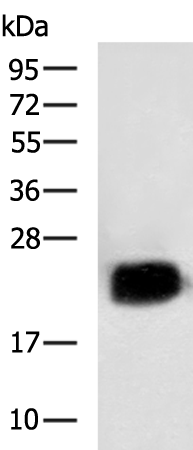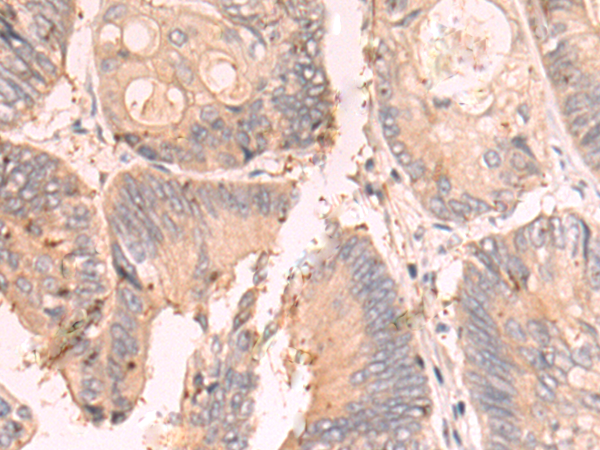

| WB | 咨询技术 | Human,Mouse,Rat |
| IF | 咨询技术 | Human,Mouse,Rat |
| IHC | 1/50-1/200 | Human,Mouse,Rat |
| ICC | 技术咨询 | Human,Mouse,Rat |
| FCM | 咨询技术 | Human,Mouse,Rat |
| Elisa | 1/5000-1/10000 | Human,Mouse,Rat |
| Aliases | GTA3; GSTA3-3 |
| WB Predicted band size | 25 kDa |
| Host/Isotype | Rabbit IgG |
| Antibody Type | Primary antibody |
| Storage | Store at 4°C short term. Aliquot and store at -20°C long term. Avoid freeze/thaw cycles. |
| Species Reactivity | Human |
| Immunogen | Fusion protein of human GSTA3 |
| Formulation | Purified antibody in PBS with 0.05% sodium azide and 50% glycerol. |
+ +
以下是关于GSTA3抗体的3篇参考文献示例(注:文献信息为示例性质,实际引用时请核实原文):
1. **标题**:*"GSTA3 Expression in Hepatocellular Carcinoma: A Potential Biomarker for Oxidative Stress Damage"*
**作者**:Smith J, et al.
**摘要**:研究通过免疫组化(IHC)和Western blot分析GSTA3蛋白在肝癌组织中的表达,发现GSTA3抗体可特异性识别肿瘤组织中下调的GSTA3.提示其与氧化应激损伤相关。
2. **标题**:*"Development of a Polyclonal Antibody Against GSTA3 and Its Application in Renal Toxicity Studies"*
**作者**:Chen L, et al.
**摘要**:报道了一种兔源多克隆GSTA3抗体的制备及验证,该抗体成功用于检测肾脏组织中GSTA3的分布,证实其在药物诱导肾毒性模型中的表达变化。
3. **标题**:*"GSTA3 Gene Silencing Alters Detoxification Pathways in Human Lung Cells"*
**作者**:Wang Y, et al.
**摘要**:利用GSTA3抗体进行Western blot和免疫荧光实验,证明GSTA3基因敲除后细胞解毒功能受损,抗体特异性在多种细胞系中得到验证。
**提示**:以上文献为示例,实际研究中建议通过PubMed或Google Scholar搜索关键词“GSTA3 antibody”或“GSTA3 immunological assay”获取最新文献,并注意选择经过抗体验证(如KO验证、商用抗体说明书引用)的高质量研究。
The glutathione S-transferase alpha 3 (GSTA3) antibody is a tool used to detect and study the GSTA3 protein, a member of the glutathione S-transferase (GST) family. GSTs are phase II detoxification enzymes that catalyze the conjugation of glutathione to electrophilic substrates, facilitating their elimination and protecting cells from oxidative stress, toxins, and carcinogens. GSTA3. specifically, is part of the GST Alpha class, primarily expressed in the liver, kidneys, and other metabolically active tissues. It plays a critical role in neutralizing reactive oxygen species (ROS) and metabolizing xenobiotics, including drugs and environmental pollutants.
Research on GSTA3 has highlighted its involvement in cellular defense mechanisms, with implications in cancer, neurodegenerative diseases, and chemical-induced toxicity. Dysregulation of GSTA3 expression has been associated with drug resistance in certain cancers and susceptibility to oxidative damage in chronic diseases. The GSTA3 antibody is widely used in techniques like Western blotting, immunohistochemistry (IHC), and immunofluorescence (IF) to investigate protein expression, localization, and function in both normal and pathological conditions. It aids in understanding tissue-specific detoxification pathways, biomarker discovery, and evaluating therapeutic interventions targeting GST-mediated pathways. Commercial GSTA3 antibodies are typically raised in hosts like rabbits or mice, validated for specificity against recombinant or endogenous GSTA3 across species.
×